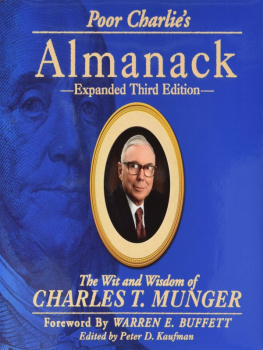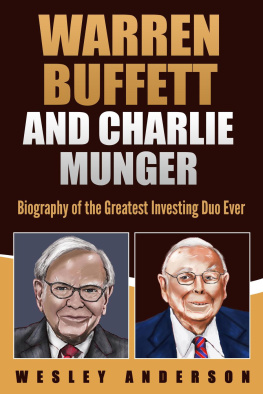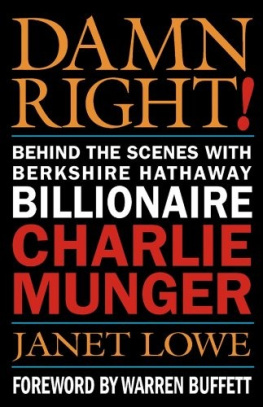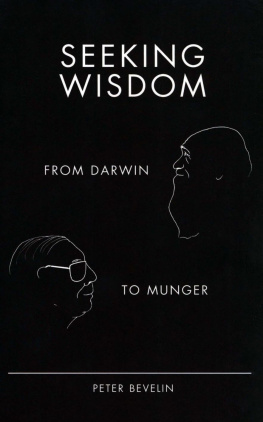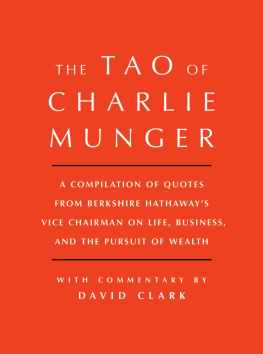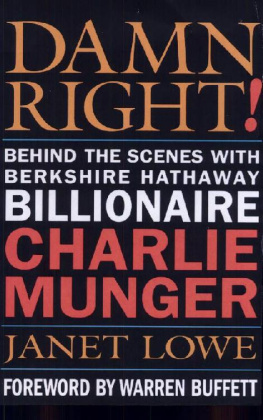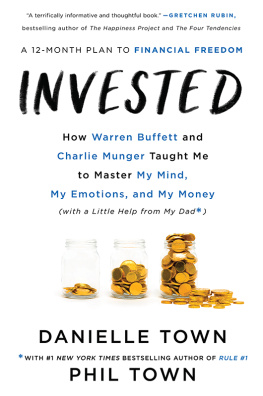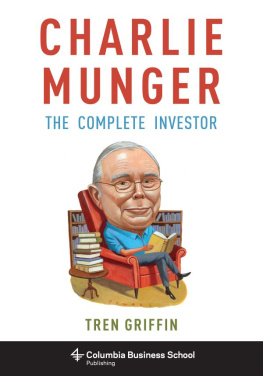Dedication
For Charles T Munger who, in his own words, would tell you:
Acquire worldly wisdom and adjust your behavior according. If your new behavior gives you a little temporary unpopularity with your peer group then to hell with them.
Rebuttal, Munger on Buffett
I think theres some mythology in the idea that Ive been this great enlightener of Warren. He hasnt needed much enlightenment. I frankly think I got more credit than I deserve. It is true that Warren had a touch of brain block from working under Ben Graham and making it ton of money. Its hard to switch from something thats worked so well. But if Charlie Munger had never lived, the Buffett record would still be pretty much what it is.
Its hard to believe that hes getting better with each passing year. It wont go on forever, but Warren is actually improving. Its remarkable: Most men in their seventies are not improving. but Warren is. Berkshire is drowning in money-we have great businesses pounding out money. When Warren is gone, the acquisition side of Berkshire will not do as well, but the rest will do well. And the acquisition side will do just fine.
I think the top guy wont be as smart as Warren. But its silly to complain, What kind of world is this that gives me Warren for forty years and then some bastard comes along whos worse?
Introduction by Peter D Kaufman
Throughout the book, Charlie reveals his intellect, wit, values, and no end of rhetorical flair. His encyclopedic knowledge allows him to cite references from classical orators to eighteenth- and nineteenth-century European literati to pop culture icons of the moment. Where else would you find Demosthenes and Cicero juxtaposed against Johnny Carson or todays investment managers set against Nietzsche, Galileo, and a one-legged man in an ass-kicking contest? Or how about Ben Franklin versus Bernie Cornfield in a battle of worldly wisdom? Using self deprecation and imagination to great effect, Charlie cheerfully compares himself to a counting horse, proposes Glotzs sugared, caffeinated water as a marketing-bereft label for Coca-Cola, and attests, At least when I was young I wasnt a total klutz.
In one talk (Practical Thought About Practical Thought?), Charlie even takes on the challenge of building, from scratch, a two-trillion-dollar business, and then walks us through his diverse mental models to accomplish that mighty feat.
The quotes, talks, and speeches presented here are rooted in the old-fashioned Midwestern values for which Charlie has become known: lifelong learning, intellectual curiosity, sobriety, avoidance of envy and resentment, reliability, learning from the mistakes of others, perseverance, objectivity, willingness to test ones own beliefs, and many more. But his advice comes not in the form of stentorian admonishments; instead, Charlie uses humor, inversions (following the directive of the great algebraist, Jacobi, to Invert, always invert), and paradox to provide sage counsel about lifes toughest challenges.
Charlie also employs historical and business case studies to great effect. In these presentations, he makes his points with subtlety and texture, often using a story-like context instead of abstract statements of theory. He regales his audience with humorous anecdotes and poignant tales, rather than with a blizzard of facts and figures. He well knows, and wisely exploits, the traditional role of the storyteller as purveyor of complex and detailed information. As a result, his lessons hang together in a coherent latticework of knowledge, available for recall and use when needed.
It is clear throughout these talks and speeches that Charlie places a premium on life decisions over investment decisions. His mental models, drawn from every discipline imaginable, recur repeatedly and, in no way, focus on business portfolio strategy or beta or Cap M. Rather they center on fundamental truth, human accomplishment, human foibles, and the arduous path to wisdom. Charlie once said, i wanted to get rich so I could be independent, like Lord John Maynard Keynes. Independence is the end that wealth serves for Charlie, not the other way around.
About the Book:
We open with a portrait biography that chronicles Charlies progress from a modest Omaha childhood to prodigious financial success. New to the second edition, Charlie then offers us his reflections on aging, inspired by Ciceros Discourse of Old Age. Next, we summarize the Munger approach to life, learning, decision making, and investing. This section details both Charlies unconventional way of thinking and his extraordinary work ethic-the twin fonts of his amazing success. Our Mungerisms: Charlie Unscripted section presents a collection of the trenchant remarks he has made at past Berkshire Hathaway and Wesco Financial annual meetings.
In the balance of the book, Charlie speaks to his audience via speeches and talks he gave over a twenty-year period. In this expanded third edition of the book, we have added a new talk Charlie delivered at the USC Gould School of Law Commencement on May 13th, 2007. So the original Ten Talks have grown to become a not-so-round Eleven Talks. These speeches and addresses cover a wide spectrum of Charlies interests, ranging from how one acquires worldly wisdom, to how his Multiple Mental Models can be applied to business, so how the investment strategies used by charitable foundations can be improved. The eleventh talk is a special edition of The Psychology of Human Misjudgment that Charlie created especially for this book. Each talk is well worth our time not only for the enjoyment it will provide you, but also for what you can absorb from the rich assortment of ideas and practices that Charlie relies on. You will probably never find a better opportunity to learn from someone so smart-and so forthright. In his talks, Charlie simply opens up and tells it like it is. A special note: Charlies redundancy in expressions and examples is purposeful: for the kind of deep fluency he advocates, he knows that repetition is the heart of instruction.
A word about the style and layout of the book: Charlie is enormously curious about nearly everything he bumps into in life. Accordingly, as we ourselves bumped into people, places, and subjects mentioned by Charlie in his talks, we supplemented his text with related information, photographs, and other graphics. The sidebars peppered throughout the talks, for example, serve to explain concepts, add a supporting voice, or emphasize an important Munger idea. We hope these sidebars will not only inform, but also amuse and even encourage you to further pursue these subjects on your own.
I wish you good reading and an appreciation of the brightness and dry humor that those of us who know Charlie Munger have come to treasure and expect from him.
Chapter
A Portrait of Charles T Munger By Michael Broggie
The next thing most like living ones life over again seems to be a recollection of that life, and to make that recollection as durable as possible by putting it down in writing. - Benjamin Franklin
Behind the extraordinary story of Berkshire Hathaway are two financial geniuses: the widely acclaimed Warren Buffett and his silent partner, Charlie Munger, who relishes his obscurity.
Charlie is Warrens friend, lawyer, adviser, devils advocate (Warren once called him the abominable no-man), and one of the largest stockholders in one of the most successful publicly traded companies in American business history. Since 1964, when Warren, and some years later, Charlie, assumed management of Berkshire, its market value has increased an astonishing 13,500 times, from $10 million to roughly $135 billion, without much of an increase in outstanding shares. Such phenomenal growth is the singular achievement of these two unassuming Mid-westerners, who combine their synergistic abilities to recognize and seize
Next page
